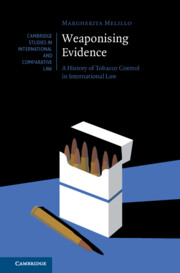Book contents
- Weaponising Evidence
- Cambridge Studies in International and Comparative Law: 183
- Weaponising Evidence
- Copyright page
- Contents
- Acknowledgements
- Chronology
- Table of Cases
- Table of Treaties
- Abbreviations
- 1 Introduction
- 2 The Negotiation of the WHO Framework Convention on Tobacco Control
- 3 The Activities of the FCTC Conference of the Parties
- 4 Philip Morris v Uruguay (ICSID) and Australia – Plain Packaging (WTO)
- 5 Conclusions
- Annex List of Interviewees
- Index
- Cambridge Studies in International and Comparative Law
4 - Philip Morris v Uruguay (ICSID) and Australia – Plain Packaging (WTO)
Strategic Evidentiary Challenges against Tobacco Control Measures
Published online by Cambridge University Press: 11 January 2024
- Weaponising Evidence
- Cambridge Studies in International and Comparative Law: 183
- Weaponising Evidence
- Copyright page
- Contents
- Acknowledgements
- Chronology
- Table of Cases
- Table of Treaties
- Abbreviations
- 1 Introduction
- 2 The Negotiation of the WHO Framework Convention on Tobacco Control
- 3 The Activities of the FCTC Conference of the Parties
- 4 Philip Morris v Uruguay (ICSID) and Australia – Plain Packaging (WTO)
- 5 Conclusions
- Annex List of Interviewees
- Index
- Cambridge Studies in International and Comparative Law
Summary
Chapter 4 examines the wave of cases before international courts and tribunals (ICTs) against the most innovative tobacco control measures, focusing in particular on Philip Morris v Uruguay (ICSID) and Australia – Plain Packaging (WTO). It contends that the alleged ineffectiveness of the tobacco control measures was one of the key arguments of the claimants, who supported their claims by submitting a hefty amount of evidence. These evidentiary challenges presented novel and demanding tasks for adjudicators of ICTs. Against this backdrop, this chapter first analyses the nature and features of the evidentiary challenges to tobacco control measures (Section 4.2). Second, it reviews how the ICTs have assessed them, zooming in on the interpretation of flexibilities and the use of different sources of evidence (Section 4.3). The picture that emerges from this chapter is that of unnecessary, manufactured complexity. Shifting the discussions on tobacco control measures from the WHO/FCTC to trade and investment ICTs, the tobacco industry has effectively managed to masterfully use international law to its own advantage. It has reframed the debate, all while starting expensive and lengthy judicial proceedings that have taken almost a decade to be concluded.
Keywords
- Type
- Chapter
- Information
- Weaponising EvidenceA History of Tobacco Control in International Law, pp. 183 - 256Publisher: Cambridge University PressPrint publication year: 2024



